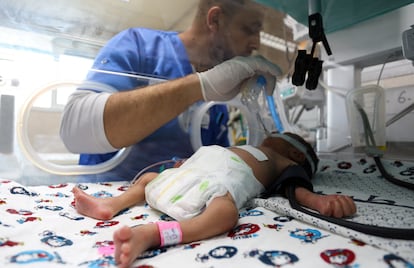Pregnant women in Gaza in dire straits with no food, water or anesthesia for Cesareans
Some 50,000 pregnant women live in the enclave, of whom around 5,500 will give birth during the month, which is more than 180 births per day, according to the U.N. Neither mothers nor newborns are receiving the assistance they need


Islam Hussein gave birth to her baby hours after losing another child in an Israeli bombing in Gaza. She was 10 days away from her due date and recalls having breakfast with her family when Israeli air forces attacked “the house next door.” The roof of her home also collapsed. “I felt that there was rubble on me and I couldn’t move, I started screaming until the rescuers found me and took me to the ambulance,” according to testimony collected at Al Shifa hospital by Bisan Ouda, a United Nations Population Fund (UNFPA) worker, in an audio shared with this newspaper. She underwent an ultrasound and upon finding that the fetus’ pulse was weak, she had an emergency Cesarean section. “Thank God, the baby is fine,” she continues, although she does not have “a single part of her body without wounds.” She has named her newborn Sanad (“support” in Arabic) because another of her children, “the one they killed, wanted to name him that,” she says.
Hussein is one of the estimated 50,000 pregnant women who were living in Gaza when Hamas attacked Israel on October 7 and Benjamin Netanyahu’s government responded with a daily bombing campaign against the enclave. Some 5,500 women, according to the U.N. fund’s estimates, will give birth during the month, amounting to more than 180 births every day, of which by sheer statistics “15% may have complications.” The fertility rate in Gaza is 4.1 children per woman of childbearing age, according to UNICEF statistics.
“Pregnant women in Gaza have nowhere to go,” says Dominic Allen, UNFPA representative for Palestine, in a telephone conversation. Many are unable to reach hospitals because of the constant bombardment “and have to give birth at home, with advice by telephone from doctors or midwives” — that is, if the telephone line is working. The women who do manage to reach a health center are sent home “three hours after delivery” to make room for other women or the wounded. Without food, clean water, electricity or fuel to keep incubators and intensive care units running, and with a health system “battered and on the verge of collapse,” where doctors are forced “to work without anesthesia,” neither mothers nor newborns are getting the care they need, says Allen.
Raquel Vives, an expert in sexual and reproductive health for Médecins Sans Frontières (MSF), explains that Cesarean section “is an operation in which a woman’s skin, muscle and uterus are cut.” Due to the lack of resources in Gaza, it is being performed with just “local anesthetic for the skin.” “It is unthinkable and terrible what it must be like for a woman to undergo a Cesarean section in these conditions,” adds Vives, who says that “operations have been performed in corridors, without power.”
And it is not only women about to give birth who are at risk. Alaa al Bayaa, a 30-year-old Palestinian woman, miscarried following an Israeli air strike. “I was four months pregnant, they ordered us to evacuate the house, and they bombed it; fear took hold of me and I ran down the stairs... I ran and ran, and I thought I would stumble because of the fear,” she recounts in an interview conducted by UNFPA, to which EL PAÍS has had access.
Soon after, she began to feel “overwhelmingly fatigued,” but could not go to the hospital because “the streets were too dangerous.” When she finally made it and a doctor examined her, her whole body was “shaking.” “The doctor told me that the fetus had no pulse, that there was no hope,” she said. The fetus, however, remained in her womb. Due to the lack of resources, the doctors were unable to help her and sent her some. The told her they could only provide assistance when she experienced complications.
No milk for babies
Although there is no data on miscarriages or premature births as a result of the trauma of the bombings, Allen says that “there has been a rise” in pregnancies that do not reach full term. With more babies being born prematurely, “there are not enough incubators,” he says. “We are running out of water or food [for these children].”
“Normally, the body of a woman who has just given birth is prepared to breastfeed a newborn because of the hormones” she secretes during pregnancy and after birth, but stress, premature births or lack of food and hydration can hinder breastfeeding, explains Vives. The UNFPA representative in Palestine says infant feeding is a major concern in Gaza right now. “I know a mother with a seven-month-old baby, breastfeeding, distressed because, after the first week of the bombing, she was running out of [breast] milk, and she knows that her child’s life depended on it,” she says. That woman “had to look for alternatives, but you need clean water to make formula,” she adds.
“The health risk is huge” for all pregnant women, Allen insists. Reham Rashad Bakr, 24, is two months pregnant. “I had a hemorrhage and there is a treatment I should take, but I can’t,” she says, according to testimony made public by UNFPA. “I don’t take folic acid [a supplement needed in the first months of gestation] as I should, I don’t have enough food, and I only eat cheese, dukkah [a mixture of nuts and seeds] and thyme,” she says. There’s not even bread “because all the bakeries have been bombed,” she adds.
But what she needs most of all is security. A few days ago, at 2 a.m., she had to leave her house after a warning was sounded about an imminent bombing. “We started running. I didn’t even manage to put on my sneakers, my children were running barefoot.... We were only able to cover our heads and run quickly out of fear,” she says. “We are psychologically tired;” she adds. “We die 100 times a day from fear.”
Sign up for our weekly newsletter to get more English-language news coverage from EL PAÍS USA Edition
Tu suscripción se está usando en otro dispositivo
¿Quieres añadir otro usuario a tu suscripción?
Si continúas leyendo en este dispositivo, no se podrá leer en el otro.
FlechaTu suscripción se está usando en otro dispositivo y solo puedes acceder a EL PAÍS desde un dispositivo a la vez.
Si quieres compartir tu cuenta, cambia tu suscripción a la modalidad Premium, así podrás añadir otro usuario. Cada uno accederá con su propia cuenta de email, lo que os permitirá personalizar vuestra experiencia en EL PAÍS.
¿Tienes una suscripción de empresa? Accede aquí para contratar más cuentas.
En el caso de no saber quién está usando tu cuenta, te recomendamos cambiar tu contraseña aquí.
Si decides continuar compartiendo tu cuenta, este mensaje se mostrará en tu dispositivo y en el de la otra persona que está usando tu cuenta de forma indefinida, afectando a tu experiencia de lectura. Puedes consultar aquí los términos y condiciones de la suscripción digital.








































